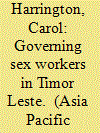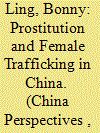| Srl | Item |
| 1 |
ID:
103959


|
|
|
|
|
| Publication |
2011.
|
| Summary/Abstract |
This paper argues that international security forces in Timor Leste depend upon civilian partners in HIV/AIDs 'knowledge networks' to monitor prostitutes' disease status. These networks produce mobile expertise, techniques of government and forms of personhood that facilitate international government of distant populations without overt coercion. HIV/AIDs experts promote techniques of peer education, empowerment and community mobilisation to construct women who sell sex as health conscious sex workers. Such techniques make impoverished women responsible for their disease status, obscuring the political and economic contexts that produced that status. In the militarised context of Timor Leste, knowledge of the sexual conduct of sub-populations labelled high risk circulates among global HIV/AIDs knowledge networks, confirming their expert status while obscuring the sexual harm produced by military intervention. HIV/AIDs knowledge networks have recently begun to build Timorese sex worker organisations by contracting an Australian sex worker NGO to train a Timorese NGO tasked with building sex worker identity and community. Such efforts fail to address the needs and priorities of the women supposedly empowered. The paper engages theories of global knowledge networks, mobile technologies of government, and governmentality to analyse policy documents, reports, programmes, official statements, speeches, and journalistic accounts regarding prostitution in Timor Leste.
|
|
|
|
|
|
|
|
|
|
|
|
|
|
|
|
| 2 |
ID:
162089


|
|
|
|
|
| Summary/Abstract |
Prostitution is illegal in China and is frequently the target of law enforcement crackdowns. In recent years, the country’s growing emphasis on combating human trafficking has also increased the profile of these anti-prostitution campaigns. This is seen in China’s current anti-trafficking roadmap, which identifies the nationwide eradication of prostitution as an important prong of the country’s anti-trafficking campaign. The two phenomena of prostitution and trafficking in women, or female trafficking, are nevertheless not equivalent. This article argues that, in the contemporary discourse on prostitution and female trafficking in China, the two issues are often conflated. The two terms are used interchangeably in a way that has affected the conceptualisation of female trafficking as a phenomenon that is largely synonymous with prostitution. This problem is exacerbated by the social stigma attached to women who are engaged in prostitution, regardless of the circumstances of their entry. Another aspect of this discourse is its dissociation from historical context, despite the fact that neither prostitution nor the trafficking in Chinese women for the exploitation of prostitution are newly arrived challenges for the present generation. The article therefore argues that discussions on prostitution and female trafficking in China would benefit from a conceptually clear framework that examines these challenges as more than a singular purpose of exploitation or a challenge of modernity.
|
|
|
|
|
|
|
|
|
|
|
|
|
|
|
|